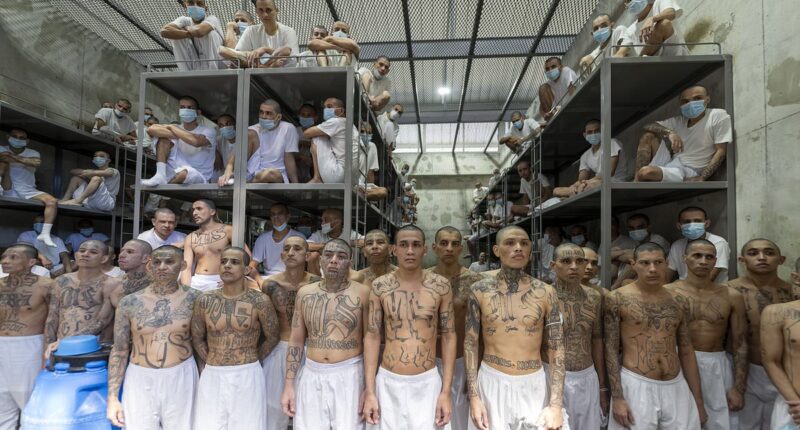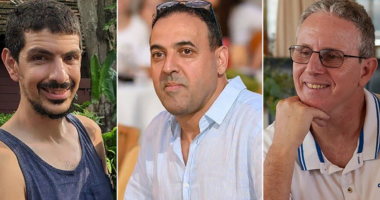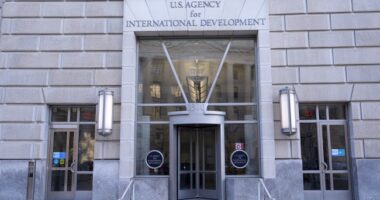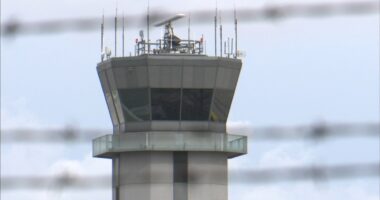
Deeply embedded in shaved and intricately tattooed heads, a hundred sets of eyes – empty and dim – are piercing directly into my own. The individuals they belong to have carried out atrocities almost too horrific to fathom.
Part of two of the most brutal rival factions in existence, El Salvador’s Ms-13 and Barrio 18, they committed acts of rape and torture, murder and mutilation, dismembering bodies and scattering them across the streets to instill fear in the communities they dominated.
During my trip to the internationally recognized prison where they are held, the nation’s new Terrorism Confinement Centre (CECOT), my official guides had presented me with photographic proof of their gruesome actions.
One man had been impaled with a tree branch through his torso before being decapitated; another was anally gang-raped before being tied to a car and dragged to his death.
Standing a few feet away from the cage holding 100 perpetrators of this kind of savagery – one of 32 mass cells that line Module 8 in the vast fortress prison – is a deeply unnerving experience.
Under the men’s intense gaze, cold sweat trickles down my spine, and I feel waves of revulsion and fear. And yet, counter-intuitive though it might seem, these emotions are tempered by a degree of pity.
I think anyone with a modicum of compassion who witnessed the harrowing scenes that confronted me this week, when I became the first British journalist allowed inside this godforsaken place, would share that sentiment.
Everyone has their own vision of hell. For George Orwell, in his dystopian classic 1984, it was a boot forever stamping on a human face. However, I can imagine no greater torment than being consigned to CECOT, with no hope of ever being released, like the inmates here whose sentences range from 60 to more than 1,000 years.
Death would be infinitely more merciful. A thought that might concentrate the minds of the violent US criminals and lawless migrants Donald Trump aims to banish here, under the terms of an unprecedented deal agreed with El Salvador’s president this week. I will come back to that.
One of the world’s biggest prisons, with a 40,000 capacity (equivalent to almost half the UK’s current prison population), CECOT was built two years ago amid a huge crackdown on the gangs destroying the fabric of Salvadoran society.
Its director Belarmino Garcia declined to tell me how many prisoners are currently held there, but there are many thousands of the worst of the worst gangsters.
As the heavy gates clang behind them and they are X-rayed by sophisticated machines, they still bristle with the machismo untouchability that made El Salvador, a mountainous country the size of Wales with a population of six million, their fiefdom.
Within a few days, however, they are behaving as obediently as timorous laboratory beagles.
Some of the eyes that stare at me may still carry a malevolent glint, but for the most part they are hollow voids, for every shred of defiance and ego has been stripped away.
Pointing to the 266 prisoners said to have died behind bars since President Nayib Bukele began his much-vaunted purge, two years ago, the human rights lobby claims that brutal means are used to bring them to their knees. Garcia, a menacingly squat, stone-faced man, denies this. The total acquiescence I witnessed is achieved, he says, by enforcing an ultra-hard regime that brooks no dissent.
Having visited the US detention facility at Guantanamo Bay and the Robben Island prison where Nelson Mandela was held, the system at CECOT certainly seems harsher. Terrorists held in ‘Gitmo’ are at least afforded some privileges and can undergo rehabilitation programs.
They have access to books and writing materials, can interact with one another, exercise in the fresh air, communicate with family members, and look forward to occasional visits.
In CECOT none of those things are permitted. The sole aim is subjugation.
For 23-and-a-half hours of the day, the men are obliged to squat on mattress-less metal bunks, stacked four-storeys high, like shelves in a B&Q store.
They are permitted to speak only in whispers. Conversations with outsiders such as me, and the sinister-looking Darth Vader clones who guard their cages in visored black helmets and riot gear, are also forbidden.
One might liken this to a human zoo, but zoo animals are at least given stimuli.
Trapped in a permanently strip-lit, antiseptically clean netherworld, these men will never smell fresh air or see natural daylight again. They are fed three meals a day in their cells – of rice and beans, pasta and a boiled egg – their water is rationed by the guards who hand it to them and they use a communal lavatory.
They are only permitted to scuttle out of their cages, shackled hand and foot with heads bowed low, for a small number of reasons.
They are evacuated when the guards charge into the module brandishing machine guns to stage a ‘forced intervention’ and search their bunks. While this clean sweep takes place they must crouch on the floor in perfect rows, with their legs wrapped tightly around the man in front of them and their head pressed against his bare back, forming a human jigsaw puzzle. Anyone who spoils the pattern by fidgeting receives a sharp baton jab to the ribs.
They also sit cross-legged on the spotless module floor for a daily 30-minute Bible reading and calisthenics session.
And when their turn comes, they are removed to one of the small rooms used as courts, for remotely conducted ‘trials’ which, in almost every case, end with a guilty verdict.
They are also taken out of their cells for medical examinations. For anyone foolish enough to break a rule, the windowless punishment cell also provides a terrifying change of scenery. Such is the mental torture of being isolated in the echoing darkness of this concrete dungeon, furnished only with a stone slab and toilet, that the maximum permitted detention period is 15 days.
However, director Garcia tells me no one has been able to withstand more than ten days without being deemed ‘too ill’ to remain there, which I take to mean that they had been driven to the brink of insanity.
Invited to experience how it felt, I lasted a couple of minutes before banging on the iron door.
This, then, is the life of a captured Salvadoran gang member. A life spent sitting on a tray staring vacantly into space. It will be their existence for as long as they continue to breathe.
They can’t even commit suicide by hanging themselves because spikes prevent them from threading bedsheets through gaps in the cage roof.
Should they die here, as inevitably they will, years could pass before their relatives are informed, if they are told at all.
Determined to crush the cult that once surrounded El Salvador’s most notorious gangsters, President Bukele has banned tombstones glorifying their memory and had any existing ones smashed with sledgehammers.
The media are not given any information about the prisoners, and strongly discouraged from writing about them at all.
Shut away in this void, in a subtropical volcanic valley two hours from the capital, San Salvador, with no wifi or mobile signals, these men have effectively ceased to exist. They are the living dead.
My tour of CECOT was granted only after a lengthy negotiation with the El Salvador government, but it couldn’t have come at a timelier juncture. For the previous day, US Secretary of State Marco Rubio had visited Bukele at his lakeside estate, and the pair laid the groundwork for Trump’s latest audacious deal.
In return for generous funding, the baseball-hatted Salvadoran leader – who styles himself ‘the world’s coolest dictator’ and was the first leader in the Western hemisphere to be called by Trump after his election – offered to accept and incarcerate deported American criminals.
Rubio’s spokesman described it as ‘an extraordinary gesture never before extended by any country’.
Bukele even pledged to accept members of Latin America’s most fearsome crime syndicate, Venezuela-based Tren de Aragua, which plunders tens of millions from human trafficking, drug-smuggling, and extortion rackets.
Details of this proposal are yet to be thrashed out, and it will inevitably meet strong human rights opposition.
If it does go ahead, however, many of the deportees are sure to be kept behind CECOT’s forbidding walls, topped by razor wire surging with 15,000 volts, for it is believed to have ample space to house them.
So how does this tiny country find itself in the front line of Trump’s war on undesirable migrants?
The story begins in the 1980s, when a million or more Salvadorans fled to the US to escape grinding poverty and a bloody, 13-year civil war.
Many settled in gang-blighted Los Angeles ghettos where they formed their own crews, MS-13 and Barrio 18. When they returned home, in the 1990s, these mobs also took root in
El Salvador. They divided the country into territories where they extorted protection money from businesses, eliminating anyone who refused to pay or who strayed onto their turf, and often their families with them.
By 2015, El Salvador was the world’s murder capital, with 106 killings for every 100,000 of its six million population: a rate more than 100 times higher than Britain’s.
But the nadir came in March 2022, when 87 people were butchered in a single weekend. It prompted the youthful Bukele, then three years into his first presidential term, to launch his massive purge.
Declaring El Salvador to be under ‘a state of exception’ which still pertains, he sent military snatch-squads to reclaim gang strongholds and passed sweeping hardline decrees.
Simply sporting a gang-related tattoo was sufficient to earn a 20-year jail sentence. Child gangsters as young as 12 were summarily hauled off the streets, phones were bugged, hotlines were set up for neighbours to shop one another.
As of last month, 84,000 alleged gang members and associates – roughly two per cent of the adult population – were in jail.
Bukele’s gangbusting model is now being copied by governments throughout Latin America, and its £100 million bastion is the supposedly escape-proof CECOT.
From having the world’s worst murder rate, El Salvador now has one of the lowest, projecting a ratio of less than one per 100,000 this year.
And as I have seen this week, the societal transformation is little short of astonishing.
Driving along the Golden Highway outside San Salvador, my fixer, Claudia Galdana, told me she regularly saw dumped bin-bags stuffed with body parts when she took this route a few years ago. Today it is a pleasant thoroughfare.
Before the mass arrests, the city centre was a virtual no-go zone. Now it is the hub of a burgeoning tourism industry.
On Tuesday night, I sauntered through the central square, with its handsome cathedral and palace, and a vast new 24-hour library (one of several projects funded by China), feeling as safe as in any of the 100 or so countries I’ve visited.
Earlier we went to La Campanera, a once-feared suburb whose homes were often commandeered by MS-13. Isabel Garcia, 75, told me that in the past she was permitted to stay only by paying dope-smoking mobsters who controlled her alley a ‘tax’ whenever she left the house.
Returning from church one night, she saw the gangsters heaving four heavy bags along the street. The following day she learned they contained the bodies of murdered rivals.
Such sights are now a distant memory. La Campanera has been reclaimed as a vibrant residential area, with a new school and colourful murals replacing the gangs’ scrubbed-off graffiti.
The police station, which had been humiliatingly requisitioned by MS-13, is serving the community once again.
All this has made Bukele hugely popular. Slyly circumventing a constitutional rule that prevents El Salvador’s presidents serving more than one, five-year term, he was re-elected last February with 85 per cent of the vote.
For a sizeable minority, however, the nation’s deliverance from the gangs has come at a heavy price. They are the ones wrongly detained for alleged gang participation or collusion, sometimes on the flimsiest of evidence.
The mother of one such boy claims police took him to be a gangster purely because of his haircut. He has since disappeared. Whether the liberation of six million people justifies such iniquities is a matter for debate.
Serving us coffee in a ramshackle cafe near the summit of San Salvador volcano, waitress Yamileph Diaz, aged 20, relates a story that encapsulated the dilemma.
When the gangs controlled this mountainside, her family defied their demands for protection money, and she feared they would carry out a threat to rape her.
Then, in 2019, her brother Jonathan, 27, vanished, never to be seen again. When their tormentors were rounded up, therefore, she praised the president.
But during the first wave of arrests, in 2022, another of her brothers, Joaquin, 25, was accused – unfairly, she insists – of gang activity, and he has been held without trial ever since.
‘So, you see, I have seen both sides of this, and it’s a difficult balance,’ she says. ‘But those men were so terrible, I would still say life is better now than before.’
When those dead eyes stared out at me in CECOT, the following morning, Yamileph’s story came back to me.
Director Garcia ordered some prisoners to stand before me as he reeled off their evildoing.
Number 176834, Eric Alexander Villalobos – alias ‘Demon City’ – had belonged to a sub-clan, or clica, called the Los Angeles Locos. His long list of crimes included planning and conspiring an unspecified number of murders, possessing explosives and weapons, extortion and drug-trafficking. He was serving 867 years.
In 2015, prisoner 126150, Wilber Barahina, alias ‘The Skinny One’, took part in a massacre so ruthless that it even caused shockwaves in a country then thought to be unshockable.
Five builders were kidnapped and put to death simply for working in the ‘wrong area’. For this he was doing 160 years.
Two other gangsters paraded before me had assassinated soldiers and police officers.
As the prison commandant exhibited them they stood like dehumanized statues, motionless even when he prodded their naked torsos to explain the significance of their tattoos.
It struck me, bizarrely, that these intricately inked etchings were the only works of art in the soulless, grey hangar.
Yet along with the symbols of allegiance, and the names of girlfriends and children they would never again see, they depicted images of devil worship and ritual slaughter.
I was permitted one, three-minute interview with a prisoner, but his answers to my questions were so robotic that they seemed to have been scripted.
Sitting before me in a plastic chair with his hands manacled, Marvin Ernesto Medrano confessed to committing ‘many murders’, but said he had been convicted only of two ‘minor’ ones.
In a flat, emotionless voice, he said he was treated well and had his basic needs met.
There was no contrition, no emotional message to his children or show of despair.
Only the bland resignation that he was here for eternity, and a trite message to young people to ‘live a good, family life’ and not follow his example.
Would he rather be dead than serve out his 100-year sentence? He shook his shaved head.
‘You know the saying: if we are alive, we still hope,’ he said, though his words had an empty ring. Then he was led away.
In a ploy designed to ensure gang members don’t band together in their cages and hatch some whispered plot, MS-13 and Barrio 18 rivals have been forced to intermingle.
So far, this policy appears to have paid off, for according to Garcia there have been no attempted insurrections, nor any troublesome outbreaks since the prison opened.
Whether that will change if, and when, Trump sends plane-loads of America’s worst to El Salvador remains to be seen, but the director is confident he and his Darth Vader guards can handle every eventuality.
‘The authorities will decide what happens, but we are ready to receive any kind of criminals, no matter what their profile,’ he told me with a mirthless smile, adding: ‘I am ready!’
Perhaps so. But as this typically Trumpian social experiment unfolds, governments with their own migration crises – among them, of course, Britain – will doubtless follow its progress with keen interest.
For my part, I will never forget those dark, fathomless eyes.

















